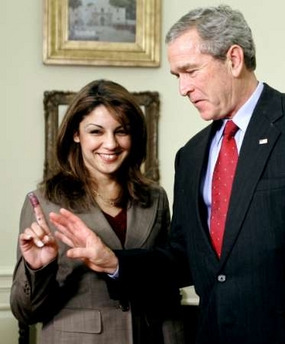Cross-posted at the paper tiger…
It takes a lot to flabbergast me these days. I mean is anyone really shocked by the relevation that the NSA is engaged in domestic surveillance, authorized by the Preznit, without any judicial review, not even by the secret court which generally reviews such things (apparently any kind of oversight is too much oversight for the Bush Administration, which certainly leads one to question just whom they are surveilling, and why).
Here’s what it took for me to gaze upon my computer screen in slack-jawed amazement: this story, via the invaluable Digby, about a student who was visited by agents from Homeland Security because, wait for it…
He tried to check out a copy of Mao Zedong’s “Little Red Book” from a university library.
No, really.
Two history professors at UMass Dartmouth, Brian Glyn Williams and Robert Pontbriand, said the student told them he requested the book through the UMass Dartmouth library’s interlibrary loan program.
The student, who was completing a research paper on Communism for Professor Pontbriand’s class on fascism and totalitarianism, filled out a form for the request, leaving his name, address, phone number and Social Security number. He was later visited at his parents’ home in New Bedford by two agents of the Department of Homeland Security, the professors said.
The professors said the student was told by the agents that the book is on a “watch list,” and that his background, which included significant time abroad, triggered them to investigate the student further.
“I tell my students to go to the direct source, and so he asked for the official Peking version of the book,” Professor Pontbriand said. “Apparently, the Department of Homeland Security is monitoring inter-library loans, because that’s what triggered the visit, as I understand it.”…
…The professors had been asked to comment on a report that President Bush had authorized the National Security Agency to spy on as many as 500 people at any given time since 2002 in this country.
The eavesdropping was apparently done without warrants.
The Little Red Book, is a collection of quotations and speech excerpts from Chinese leader Mao Tse-Tung.
In the 1950s and ’60s, during the Cultural Revolution in China, it was required reading. Although there are abridged versions available, the student asked for a version translated directly from the original book.
The student told Professor Pontbriand and Dr. Williams that the Homeland Security agents told him the book was on a “watch list.” They brought the book with them, but did not leave it with the student, the professors said.
Dr. Williams said in his research, he regularly contacts people in Afghanistan, Chechnya and other Muslim hot spots, and suspects that some of his calls are monitored.
“My instinct is that there is a lot more monitoring than we think,” he said.
Dr. Williams said he had been planning to offer a course on terrorism next semester, but is reconsidering, because it might put his students at risk.
“I shudder to think of all the students I’ve had monitoring al-Qaeda Web sites, what the government must think of that,” he said. “Mao Tse-Tung is completely harmless.”
So can I just say, I am so going to Guantanamo? I mean, I have maybe four Little Red Books floating around my house, in both English and Chinese, including one featuring Mao’s then “Closest Comrade in Arms” Lin Biao’s calligraphy on the frontispiece, which I figure, given the brief tenancy of anyone occupying that particular position, has got to be some kind of collector’s item.
In fact, I’ve had one of my “Xiao Hong Shu” since high school, when my school represented “Red China” in the annual Model United Nations conference. Which, come to think of it, is probably another black mark on my permanent record.
And boy, if any of these hard-working Homeland Security agents have actually surveyed my house – I’m doomed. What would they make of the wall of books dealing with the history of the Peoples Republic of China? The Collected Works of Mao Zedong? The compilations of CCP documents? The framed Four Modernizations posters on my wall, one of the “Peoples’ Premier,” Zhou Enlai, showing his domestic side, spinning yarn in Yenan, the other of a rosey-cheeked, chubby baby holding up this, well, I’m not sure what it’s supposed to be, some kind of festive, lantern thingie with a nuclear atom in the center and a rocket ship on top? Not to mention my, erm, Chairman Mao piggybank.
Remind me again. Was it ultra-leftist, unreconstructed Red Guards who flew planes into the WTC?
But maybe I’ve got this whole thing wrong. Maybe owning such things isn’t the problem. Given the obsession that the Bush Administration seems to have with wanting to access library records (without the patrons’ knowledge), well, maybe it’s libraries that are the real danger here, the subterranean threat to American security.
Just remember: if library cards are terrorized, soon only terrorists will have library cards. Or something.

Comments